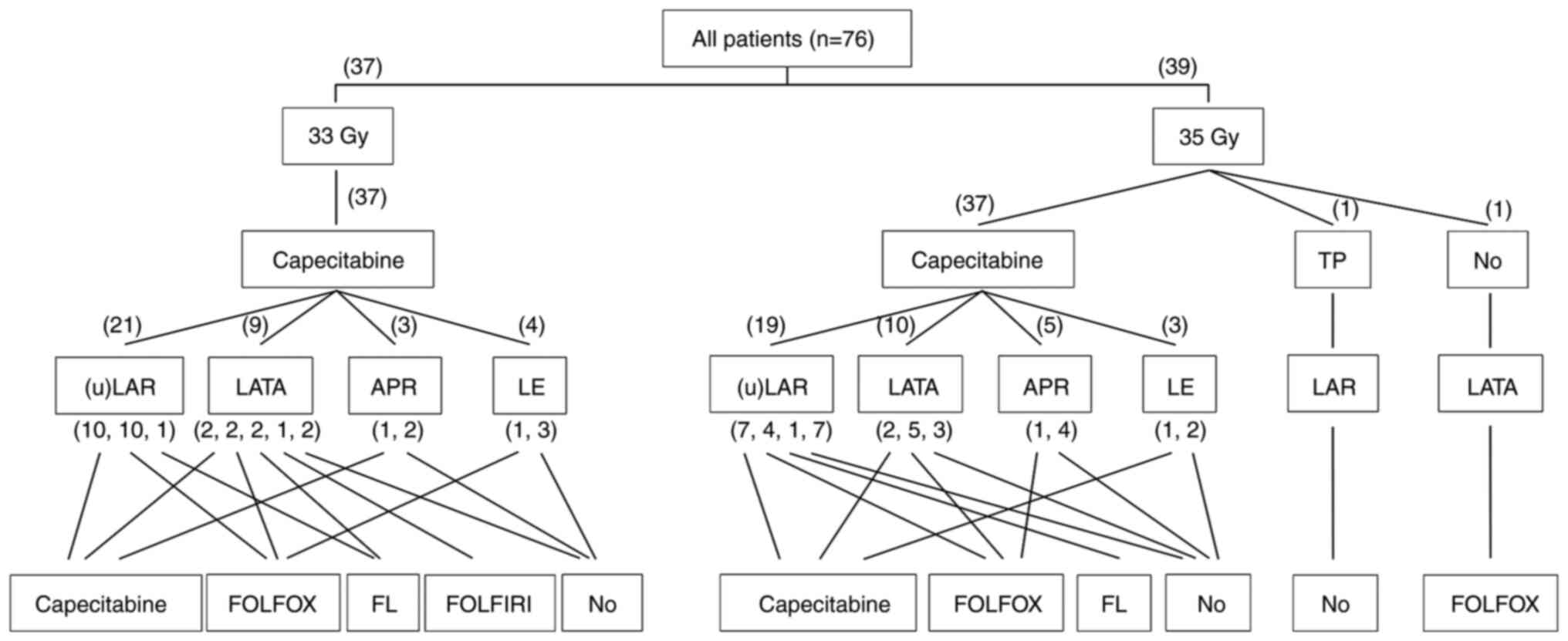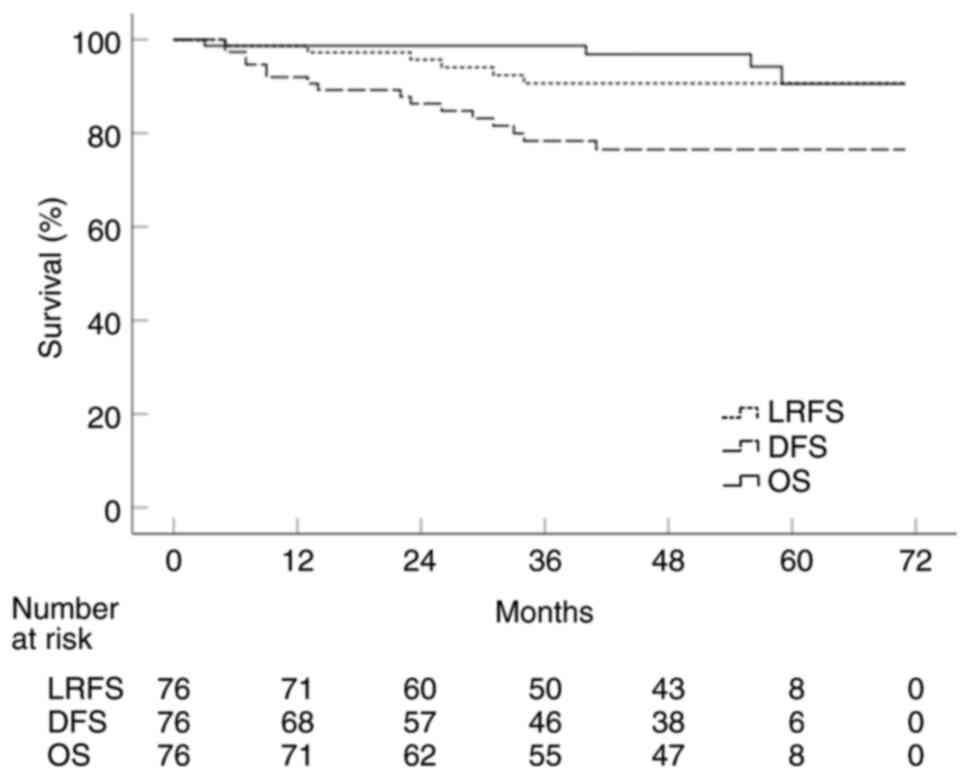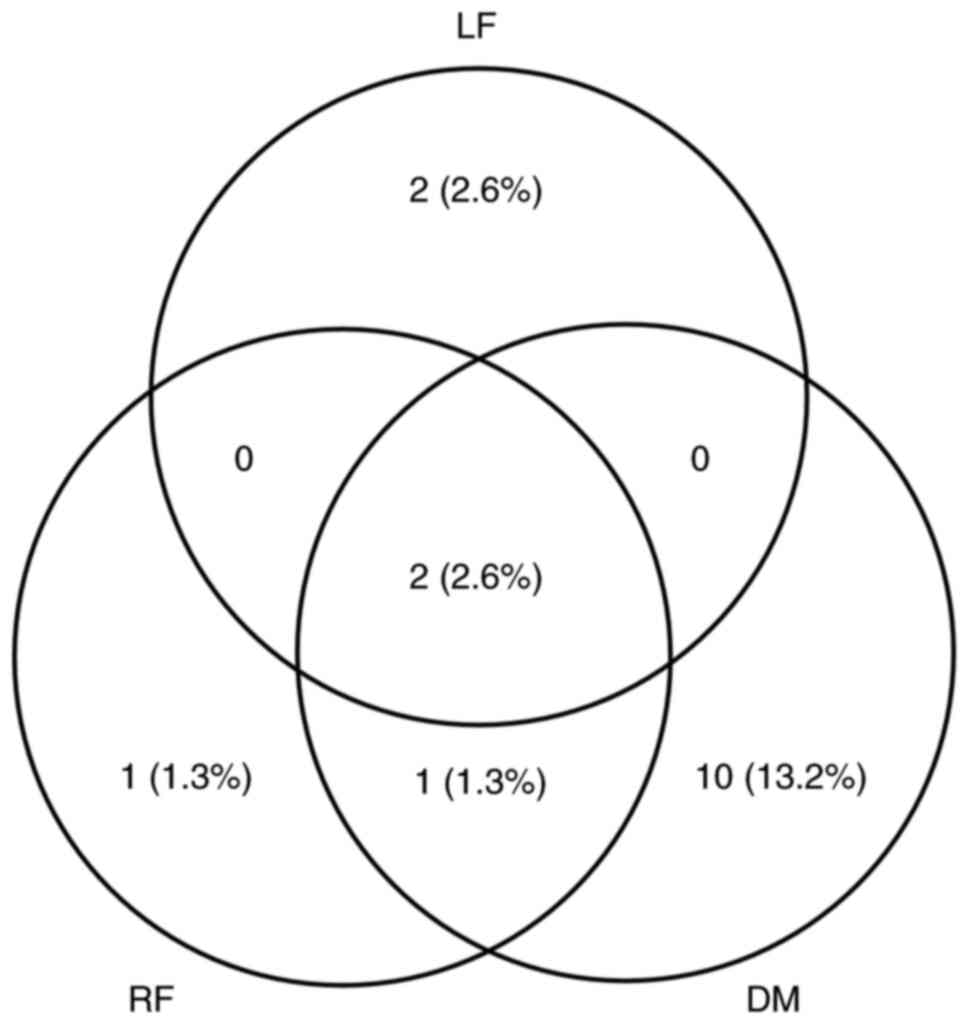|
1
|
Sauer R, Liersch T, Merkel S, Fietkau R,
Hohenberger W, Hess C, Becker H, Raab HR, Villanueva MT, Witzigmann
H, et al: Preoperative versus postoperative chemoradiotherapy for
locally advanced rectal cancer: Results of the German
CAO/ARO/AIO-94 randomized phase III trial after a median follow-up
of 11 years. J Clin Oncol. 30:1926–1933. 2012. View Article : Google Scholar : PubMed/NCBI
|
|
2
|
Folkesson J, Birgisson H, Pahlman L,
Cedermark B, Glimelius B and Gunnarsson U: Swedish rectal cancer
trial: Long-lasting benefits from radiotherapy on survival and
local recurrence rate. J Clin Oncol. 23:5644–5650. 2005. View Article : Google Scholar : PubMed/NCBI
|
|
3
|
van Gijn W, Marijnen CA, Nagtegaal ID,
Kranenbarg EMK, Putter H, Wiggers T, Rutten HJT, Påhlman L,
Glimelius B and van de Velde CJH; Dutch Colorectal Cancer Group, :
Preoperative radiotherapy combined with total mesorectal excision
for resectable rectal cancer: 12-year follow-up of the multicentre,
randomised controlled TME trial. Lancet Oncol. 12:575–582. 2011.
View Article : Google Scholar : PubMed/NCBI
|
|
4
|
Sebag-Montefiore D, Stephens RJ, Steele R,
Monson J, Grieve R, Khanna S, Quirke P, Couture J, de Metz C, Myint
AS, et al: Preoperative radiotherapy versus selective postoperative
chemoradiotherapy in patients with rectal cancer (MRC CR07 and
NCIC-CTG C016): A multicentre, randomised trial. Lancet.
373:811–820. 2009. View Article : Google Scholar : PubMed/NCBI
|
|
5
|
Bujko K, Nowacki MP, Nasierowska-Guttmejer
A, Michalski W, Bebenek M and Kryj M: Long-term results of a
randomized trial comparing preoperative short-course radiotherapy
with preoperative conventionally fractionated chemoradiation for
rectal cancer. Br J Surg. 93:1215–1223. 2006. View Article : Google Scholar : PubMed/NCBI
|
|
6
|
Ngan SY, Burmeister B, Fisher RJ, Solomon
M, Goldstein D, Joseph D, Ackland SP, Schache D, McClure B,
McLachlan SA, et al: Randomized trial of short course radiotherapy
versus long course chemoradiation comparing rates of local
recurrence in patients with T3 rectal cancer: Trans-Tasman
radiation oncology group trial 01.04. J Clin Oncol. 30:3827–3833.
2012. View Article : Google Scholar : PubMed/NCBI
|
|
7
|
Pietrzak L, Bujko K, Nowacki MP, Kepka L,
Oledzki J, Rutkowski A, Szmeja J, Kladny J, Dymecki D, Wieczorek A,
et al: Quality of life, anorectal and sexual functions after
preoperative radiotherapy for rectal cancer: Report of a randomised
trial. Radiother Oncol. 84:217–225. 2007. View Article : Google Scholar : PubMed/NCBI
|
|
8
|
Ngan S, Fisher R, Burmeister B, Mackay J,
McLachlan S, Beresford J, McClure B, Goldstein D, Joseph D and
Solomon M: Long-term quality of life in patients treated in TROG
01.04: A randomized trial comparing short course and long course
preoperative radiation therapy for rectal cancer. Int J Radiat
Oncol Biol Phys. 84:S143–S144. 2012. View Article : Google Scholar
|
|
9
|
Initial report from a Swedish multicentre
study examining the role of preoperative irradiation in the
treatment of patients with resectable rectal carcinoma. Swedish
rectal cancer trial. Br J Surg. 80:1333–1336. 1993.PubMed/NCBI
|
|
10
|
Marijnen CAM, Kapiteijn E, van de Velde
CJH, Martijin H, Steup WH, Wiggers T, Kranenbarg EK and Leer JWH;
Cooperative Investigators of the Dutch Colorectal Cancer Group, :
Acute side effects and complications after short-term preoperative
radiotherapy combined with total mesorectal excision in primary
rectal cancer: Report of a multicenter randomized trial. J Clin
Oncol. 20:817–825. 2002. View Article : Google Scholar : PubMed/NCBI
|
|
11
|
Bujko K, Nowacki MP, Nasierowska-Guttmejer
A, Michalski W, Bebenek M, Pudelko M, Kryj M, Oledzki J, Szmeja J,
Słuszniak J, et al: Sphincter preservation following preoperative
radiotherapy for rectal cancer: Report of a randomised trial
comparing short-term radiotherapy vs. conventionally fractionated
radiochemotherapy. Radiother Oncol. 72:15–24. 2004. View Article : Google Scholar : PubMed/NCBI
|
|
12
|
Gerard JP, Chapet O, Nemoz C, Hartweig J,
Romestaing P, Coquard R, Barbet N, Maingon P, Mahe M, Baulieux J,
et al: Improved sphincter preservation in low rectal cancer with
high-dose preoperative radiotherapy: The Lyon R96- 02 randomized
trial. J Clin Oncol. 22:2404–2409. 2004. View Article : Google Scholar : PubMed/NCBI
|
|
13
|
Amin MB, Edge S, Greene F, Byrd DR,
Brookland RK, Washington MK, Gershenwald JE, Compton CC, Hess KR,
Sullivan DC, et al: AJCC cancer staging manual (8th edition).
Springer International Publishing: American Joint Commission on
Cancer; 2017
|
|
14
|
Lee JH, Kim JG, Oh ST, Lee MA, Chun HG,
Kim DY, Kim TH, Kim SY, Baek JY, Park JW, et al: Two-week course of
preoperative chemoradiotherapy followed by delayed surgery for
rectal cancer: A phase II multi-institutional clinical trial (KROG
11–02). Radiother Oncol. 110:150–154. 2014. View Article : Google Scholar : PubMed/NCBI
|
|
15
|
Sung SY, Kim DY, Jang HS, Kim TH, Park HC,
Chie EK, Nam TK, Kim SH and Lee JH: One-week versus two-week
chemoradiotherapy followed by curative surgery in rectal cancer:
Long-term comparative pooled analysis of two prospective
multicenter phase II trials. Cancer Res Treat. 2023.(Epub ahead of
print). View Article : Google Scholar
|
|
16
|
Halperin EC, Wazer DE, Perez CA and Brady
LW: Perez & Brady's principles and practice of radiation
oncology, 7th ed. Wolters Kluwer; Philadelphia: 2018
|
|
17
|
Oken MM, Creech RH, Tormey DC, Horton J,
Davis TE, McFadden ET and Carbone PP: Toxicity and response
criteria of the eastern cooperative oncology group. Am J Clin
Oncol. 5:649–655. 1982. View Article : Google Scholar : PubMed/NCBI
|
|
18
|
Rödel C, Martus P, Papadoupolos T, Füzesi
L, Klimpfinger M, Fietkau R, Liersch T, Hohenberger W, Raab R,
Sauer R and Wittekind C: Prognostic significance of tumor
regression after preoperative chemoradiotherapy for rectal cancer.
J Clin Oncol. 23:8688–8696. 2005. View Article : Google Scholar : PubMed/NCBI
|
|
19
|
US Department Of Health and Human
Services, . Common terminology criteria for adverse events (CTCAE)
version 5.0. United States: National Cancer Institute; 2017,
https://ctep.Cancer.Gov/protocoldevelopment/electronic_applications/docs/CTCAE_v5_Quick_Reference_8.5×11.pdf
|
|
20
|
Gavioli M, Luppi G, Losi L, Bertolini F,
Santantonio M, Falchi AM, D'Amico R, Conte PF and Natalini G:
Incidence and clinical impact of sterilized disease and minimal
residual disease after preoperative radiochemotherapy for rectal
cancer. Dis Colon Rectum. 48:1851–1857. 2005. View Article : Google Scholar : PubMed/NCBI
|
|
21
|
Dinaux AM, Leijssen L, Bordeianou LG,
Kunitake H, Amri R and Berger DL: Outcomes of persistent lymph node
involvement after neoadjuvant therapy for stage III rectal cancer.
Surgery. 163:784–788. 2018. View Article : Google Scholar : PubMed/NCBI
|
|
22
|
Yeo SG, Kim DY, Kim TH, Chang HJ, Oh JH,
Park W, Choi DH, Nam HR, Kim JS, Cho MJ, et al: Pathological
complete response of primary tumor following preoperative
chemoradiotherapy for locally advanced rectal cancer: Long-term
outcomes and prognostic significance of pathological nodal status
(KROG 09-01). Ann Surg. 252:998–1004. 2010. View Article : Google Scholar : PubMed/NCBI
|
|
23
|
Cho E, Park IJ, Hong SM, Lee JL, Kim CW,
Yoon YS, Lim SB, Yu CS and Kim JC: Poorer oncologic outcome of good
responders to PCRT with remnant lymph nodes defies the oncologic
paradox in patients with rectal cancer. Clin Colorectal Cancer.
18:e171–e178. 2019. View Article : Google Scholar : PubMed/NCBI
|
|
24
|
Song JH, Yu M, Kang KM, Lee JH, Kim SH,
Nam TK, Jeong JU, Jang HS, Lee JW and Jung JH: Significance of
perineural and lymphovascular invasion in locally advanced rectal
cancer treated by preoperative chemoradiotherapy and radical
surgery: Can perineural invasion be an indication of adjuvant
chemotherapy? Radiother Oncol. 133:125–131. 2019. View Article : Google Scholar : PubMed/NCBI
|
|
25
|
Saadoun JE, Meillat H, Zemmour C, Brunelle
S, Lapeyre A, de Chaisemartin C and Lelong B: Nomogram to predict
disease recurrence in patients with locally advanced rectal cancer
undergoing rectal surgery after neoadjuvant therapy: Retrospective
cohort study. BJS Open. 6:zrac1382022. View Article : Google Scholar : PubMed/NCBI
|


















